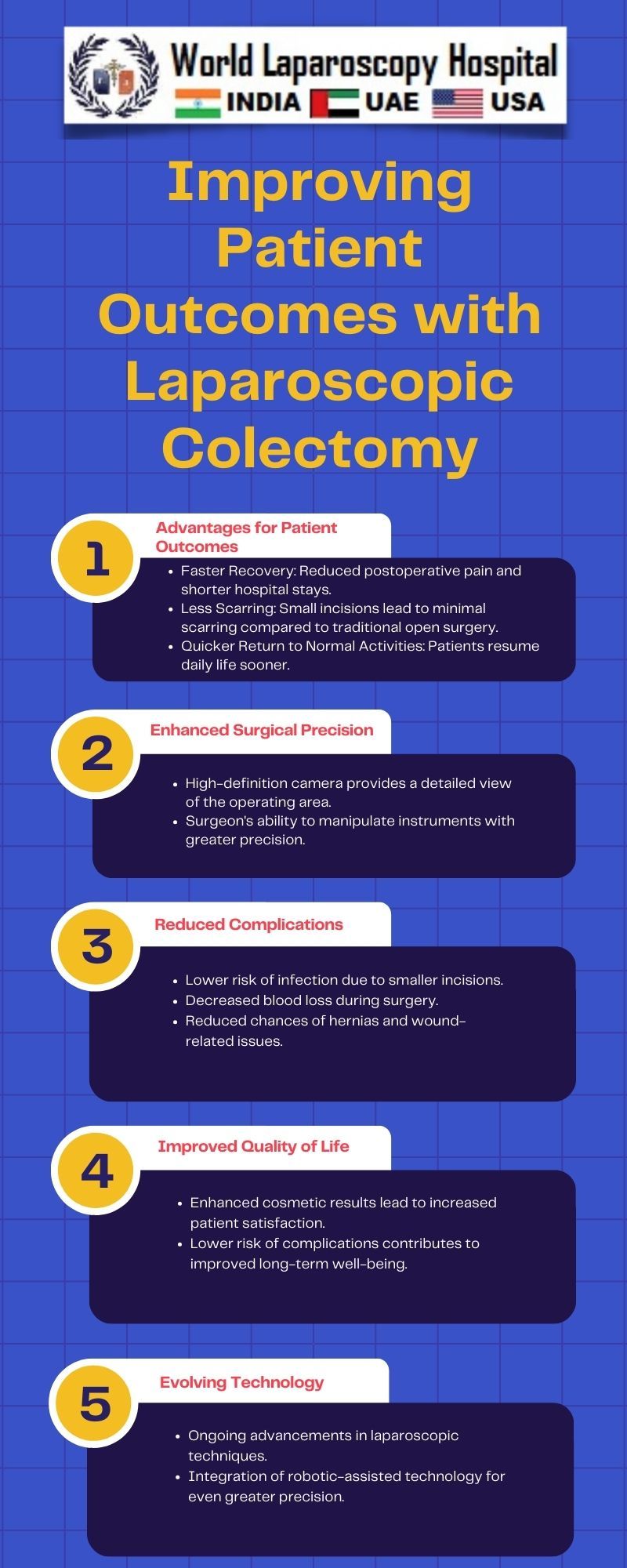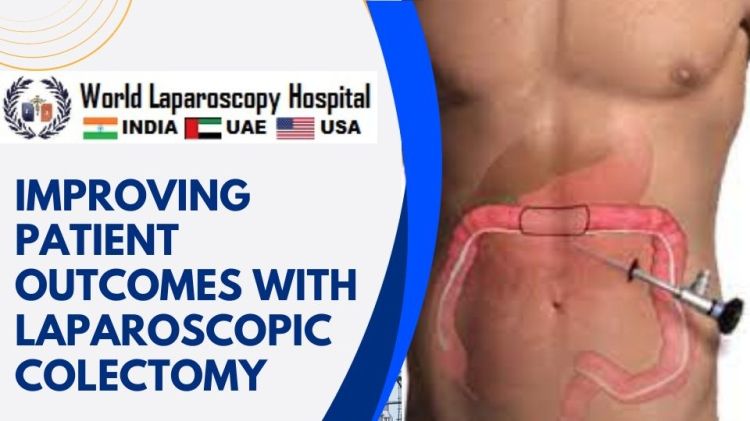Improving Patient Outcomes with Laparoscopic Colectomy
Introduction
In the realm of modern medicine, the pursuit of minimally invasive surgical techniques has revolutionized patient care. One such groundbreaking procedure that has garnered significant attention is laparoscopic colectomy, a method employed for the removal of a portion of the colon. This innovative approach has demonstrated remarkable success in improving patient outcomes compared to traditional open surgery. In this comprehensive exploration, we delve into the intricacies of laparoscopic colectomy, its advantages, and its transformative impact on the landscape of colorectal surgery.

Understanding Laparoscopic Colectomy
Laparoscopic colectomy, also known as minimally invasive colon resection or keyhole surgery, involves the removal of a segment of the colon through several small incisions rather than a single large one. A laparoscope, a thin tube with a camera and light source, is inserted through one incision, providing real-time visual access to the surgical site. Specialized instruments are then introduced through additional small incisions to perform the necessary maneuvers.
The Procedure
The surgeon begins by insufflating the abdomen with carbon dioxide gas, creating a space for better visualization and manipulation of the internal organs. The laparoscope is introduced, offering a magnified, high-definition view of the targeted area. Precise movements are executed using miniature instruments, guided by the images transmitted from the laparoscope.
Advantages of Laparoscopic Colectomy
Reduced Postoperative Pain:
One of the most significant advantages of laparoscopic colectomy is the marked reduction in postoperative pain compared to open surgery. The smaller incisions result in less tissue trauma, leading to a more comfortable recovery for patients. This is particularly beneficial in colorectal surgery, where pain management plays a crucial role in the overall patient experience.
Faster Recovery Time:
Laparoscopic colectomy is associated with a shorter recovery period than traditional open surgery. The diminished trauma to surrounding tissues allows patients to regain mobility and resume normal activities sooner. This not only contributes to a quicker return to daily life but also minimizes the economic and emotional burdens associated with prolonged hospital stays and extended rehabilitation.
Lower Risk of Complications:
The minimally invasive nature of laparoscopic colectomy reduces the risk of complications such as wound infections and hernias. The smaller incisions result in fewer wound-related issues, and the avoidance of a large abdominal incision diminishes the likelihood of postoperative infections. Consequently, patients undergoing laparoscopic colectomy experience a smoother recovery with fewer adverse events.
Improved Cosmetic Outcome:
The cosmetic benefits of laparoscopic colectomy should not be overlooked. The smaller incisions leave less noticeable scars, enhancing the aesthetic outcome for patients. This aspect is not only psychologically reassuring but also aligns with the increasing emphasis on cosmetic considerations in modern healthcare.
Enhanced Surgical Precision:
The laparoscopic approach provides surgeons with a magnified, three-dimensional view of the surgical field, enabling greater precision in tissue dissection and suturing. This heightened accuracy contributes to improved surgical outcomes, reduced intraoperative complications, and an overall higher level of patient safety.
Clinical Applications of Laparoscopic Colectomy
Colorectal Cancer Resection:
Laparoscopic colectomy has become a standard option for the resection of colorectal cancer. The procedure is employed for both early-stage and select advanced-stage tumors. Numerous studies have demonstrated comparable oncological outcomes between laparoscopic and open approaches, solidifying its role as a safe and effective method for cancer resection.
Diverticular Disease Management:
Diverticular disease, characterized by the presence of small pouches (diverticula) in the colon wall, often requires surgical intervention. Laparoscopic colectomy has proven effective in managing complicated diverticulitis, providing patients with a less invasive alternative that facilitates quicker recovery and reduced postoperative morbidity.
Inflammatory Bowel Disease Treatment:
Patients with inflammatory bowel diseases such as Crohn's disease or ulcerative colitis may require surgical intervention when medical management is insufficient. Laparoscopic colectomy is increasingly utilized in these cases, offering a viable option with fewer complications and faster recovery compared to open surgery.
Benign Colorectal Conditions:
Beyond malignancies and inflammatory conditions, laparoscopic colectomy is employed in the treatment of various benign colorectal conditions. These include polyp removal, benign tumors, and conditions requiring segmental colon resection. The versatility of laparoscopic colectomy extends its applicability across a spectrum of colorectal pathologies.
Challenges and Considerations
While laparoscopic colectomy has witnessed widespread acceptance and success, certain challenges and considerations merit attention:
Learning Curve:
The proficiency required to perform laparoscopic colectomy may necessitate a learning curve for surgeons. Adequate training and experience are crucial to mastering the technique and optimizing patient outcomes. Surgeons with extensive laparoscopic experience tend to achieve better results, highlighting the importance of ongoing education and skill development.
Cost Considerations:
The initial costs associated with laparoscopic procedures, including specialized equipment and training, may be higher than those of traditional open surgery. However, the potential long-term cost savings, attributed to reduced hospital stays and faster recovery, need to be factored into the overall economic assessment of laparoscopic colectomy.
Patient Selection:
Not all patients may be suitable candidates for laparoscopic colectomy, depending on factors such as the size and location of the lesion, the patient's overall health, and previous abdominal surgeries. Careful patient selection ensures that the benefits of laparoscopic colectomy are maximized while minimizing the risk of complications.
Emerging Technologies:
As technology continues to advance, new tools and techniques in laparoscopic surgery are constantly emerging. Surgeons must stay abreast of these developments to ensure they are offering the most advanced and effective treatments to their patients. This includes staying informed about robotic-assisted laparoscopic surgery, which represents a frontier in minimally invasive procedures.
Future Directions and Innovations
The future of laparoscopic colectomy holds exciting prospects, driven by ongoing innovations and research endeavors. Some key areas of development include:
Robot-Assisted Laparoscopy:
Robotic-assisted surgery, building on the foundation of laparoscopic colectomy, introduces robotic systems that provide enhanced dexterity and precision. Surgeons can remotely control robotic arms, allowing for even more intricate maneuvers. While still evolving, robotic-assisted laparoscopy holds promise for further optimizing outcomes in colorectal surgery.
Advanced Imaging Techniques:
Continued advancements in imaging technologies, such as augmented reality and enhanced imaging modalities, will further refine the visualization capabilities of laparoscopic colectomy. This can contribute to even greater precision and accuracy during surgery, potentially expanding the scope of conditions amenable to minimally invasive approaches.
Personalized Surgical Approaches:
Tailoring surgical approaches to individual patient characteristics, including anatomy and pathology, represents a frontier in personalized medicine. As our understanding of genetics and disease biology deepens, surgeons may be able to customize laparoscopic colectomy procedures to optimize outcomes based on each patient's unique profile.
Conclusion
Laparoscopic colectomy stands as a testament to the transformative power of minimally invasive surgery in improving patient outcomes. Its advantages, ranging from reduced postoperative pain to faster recovery times, have positioned it as a preferred option in colorectal surgery. As technology continues to advance and surgical techniques evolve, the future holds even greater promise for refining and expanding the applications of laparoscopic colectomy. This innovative approach not only enhances the quality of care but also exemplifies the ongoing commitment of the medical community to push the boundaries of possibility in the service of patient well-being.


